#Mattel failure
Explore tagged Tumblr posts
Text
The Billboard Consolation Prizes
It's that time again, folks! We're about to hand out some more prizes, mostly to those who didn't make the finals. Some were predetermined, some were voted upon by you, the viewers! Cue the theme music.
Let's start off with our first award, The Powerful Mane Award. Sadly, we couldn't do the Powerful Mustache Award for this tournament, considering there wasn't a single powerful mustache in the bunch, but we had some wicked heads of hair this time. But the lady who took the prize this time was...

Chaka Khan! Tell me that you like her, you really like her.
Next up, the "Stop, She's Already Dead!" Award. This one goes to the hardest ass-kicking of the whole tourney. I almost considered calling this The Elvis Costello Memorial Award in honor of last tournament's hardest ass-kicking, but as it turns out...this girl was defeated even harder:

June Richmond! June lost in round two to Billie Holiday, receiving just 5.5 percent of the votes. So...you may not have won the battle, but you won this little graphic.
Up next: The "She's Still Got It" Award. As we said before, there were a lot more nominees this time around that were born...a long time ago, meaning there are a lot of nominees who are no longer with us. But let's hand out an award to the absolute queen who's the oldest-living woman out of 100+ living nominees...

Leontyne Price! Miss Price was born in February of 1927, narrowly beating out Cleo Laine for this spot, and she's still here today. She's been around so long that you could say that sliced bread is the greatest thing since Leontyne Price. Keep it up, girl!
Next is a voter's choice award: The Strong and Silent Girl Award. Named after Mike Nesmith, the original strong and silent girl, this award goes out to a contestant who made it to round five without any written propaganda. Since there was a four-way tie for who made it farthest without any written words, I had you lovely people vote on which was the hottest of the four. You said it was...

Marlene Dietrich! There's a non-zero chance she starred in a silent film or two, so I suppose that's fitting.
As has become tradition, we at Billboard Hotties Tourney present The Who? What?? Award. This one goes to the most obscure nominee in the bunch, the one whose presence confuses (not because of their looks, but because...who??) Last time it was awarded to Louis "Moondog" Hardin, but this time it goes to...

Ethel Smyth! Not the kind of nominee I'd ever expect to see here, and we probably never will again.
Next is the Failure to Launch Award, granted to the nominee with the most submissions...who then lost in round one. The starting pistol went off, they took a few steps, and tripped and fell. This time, the winner of this esteemed prize is...

Debbie Harry! Deborah had eleven nominations, and initially had a lead in her poll, but lost to Joan Jett by a small margin.
Here's a new one! Thanks to our more diverse cast of characters this tournament, we had enough nominees to introduce the Eurovision Queen Award. This one was voted upon by you, and went to the hottest nominee who participated in Eurovision. This one goes to...

Françoise Hardy! Miss Hardy represented Monaco in Eurovision 1963, competing the same year as fellow round one casualty Nana Mouskouri. She ultimately tied for fifth.
Up next: The Band Assassin Award. This one goes to the nominee who defeated multiple members of one band. When I realized that most of the nominees this tournament could qualify as "solo," I knew this one was going to be a little tough. However, there was one lady who was able to do it...

Grace Slick! Grace's first two wins were against Anna Mae Winburn and Carline Ray of the International Sweethearts of Rhythm.
So let's move on t

God, every time. So let's move on to the Spanish Inquisition Award, for the nominee that nobody expected to make it as far as she did. Be it a pleasant surprise or a "Pearl beating Trixie Mattel in that lip sync" gag, it's for the person who exceeded expectations. The winner of this prize goes to...

The Godmother of Rock 'n' Roll, Sister Rosetta Tharpe! Rosetta soared all the way to the quarterfinals before she was bested by now-finalist Nina Simone. Love you, Sister, nothing but respect for my president.
Our next award was a voters' choice, The Crossover Artist Award! The Crossover Artist Award goes to the hottest contestant who was also featured in this tourney's inspiration, @hotvintagepoll. This one comes from the original tourney, too, but this one was...very different. Last time, we had, hmm, five or six nominees, but this time we had a whopping twenty-four that participated in both tourneys. Some ladies, like Eartha Kitt and Diahann Carroll, were also competitors in the @vintagetvstars tournament! Is it a commentary on how women have to be able to do more in entertainment to be seen as a success? Who knows? What I do know is that the winner of this award is...

Eartha Kitt! Beating Marlene Dietrich by about five percent, you guys picked Catwoman this time...and since she won both the movie and television brackets, it only felt right that she at least get a consolation prize, right?
Here's another OG tourney award: The Robbed Icon Award. Here's where you guys get to gripe, and I love it. This one goes to the lady with the most controversial loss in the game, and the winner this time was...

Debbie Harry! Considering that she overwhelmingly won the Queen of the Shadow Realm election, this win came as no surprise to me; you guys were pissed.
Next is the Renaissance Woman Award, voted on by you! This one is meant as a companion to the Multi-Instrumentalist Award for the men, but since there were so many ladies that do more than music here, I decided to expand the title. Does she sing? Play an instrument or two? Write or produce? Act? Dance? Volunteer at the nursing home on the weekends? Probably not the last one, but you, the voters, decided that the most accomplished or well-rounded woman here was:

Dolly Parton! Singer. Songwriter. Actress. Businesswoman. Activist. What can't she do?
Here comes the Popular Kid Award! This one goes out to the nominee with the most nominations, and this time, we have a tie. Our winners are...

Cher and Linda Ronstadt! Each of these singers received sixteen nominations, a record for this blog.
Our penultimate award is the Miss Congeniality Award. I award this one to the nominee with the best/funniest fanbase. This one was a little bit hard, since the engagement was admittedly not as strong as the men's tournament (I get it, though) but when I looked back at all the propaganda, I couldn't help but pick...

Dolly Parton! Those who submitted her had such an outpouring of love for her that really couldn't compare. Wear your title with pride, Dolly, and do good alongside Mr. Congeniality Clarence Clemons.
It's time for our final award...The Not Just a Pretty Face Award, where we celebrate the thing we love these ladies for in the first place--their music. This one has a little bit of a long story. It was a write-in, just like last time, but unlike last time, the voters could not come to a consensus. We had a five-way tie for first place between Kate Bush, Aretha Franklin, Joan Jett, Stevie Nicks, and Nina Simone. A two-way tie? Sure, I can let that slide. But five? No. I had to consult the council...and by "council" I mean "my parents, my two sisters, and my half-brother." I had them vote from the final five to see who would take home this coveted prize. In a 2 to 1 to 1 to 1 vote, our winner is...

Aretha Franklin! Show her some RESPECT.
And that's it for this tournament, folks! I hope you've enjoyed participating thus far, and I can't wait to see how the finals go. Finals begin on October 1st around midnight PST.
61 notes
·
View notes
Text
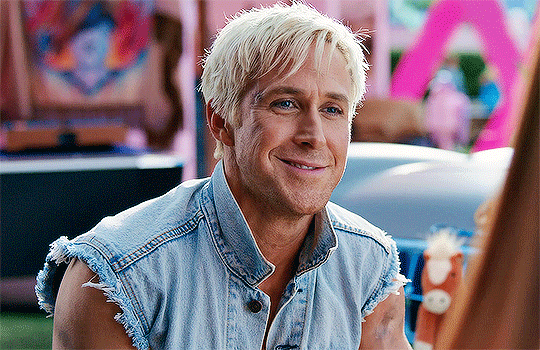
PLATONIC!YANDERE KEN X CHILD!READER
SUMMARY: Basically Ken meets the little girl that plays with him and immediately wants to adopt her
TRIGGER WARNING: READER IS ABUSED/NEGLECTED BY HER PARENTS PLEASE DO NOT READ IF THIS IS UPSETTING TO YOU
He goes with Barbie mainly because he wants to go with her but also because he wants to meet the child playing with him
As he goes about the real world and finds out about the patriarchy he stays to expect the child to be a boy with lots and lots of horse toys (and maybe a mojo dojo casa house)
See's a little girl searching for something
You are that little girl
You're just running around with teary eyes
He ecides to help you
Because real men help little girls when they are in distress
Asks what you lost
You lost her ken doll
Then you're shocked when you look at him
"KEN!!!"
Big hug
He's so shocked
The child playing with him was a tiny little girl
"Hi kid..." He says quietly
Patriarchy? He's never heard of it, all he knows is the little girl that was so upset because she thought she lost him
Realises that you're going to grow up in a world set up for your failure
You won't get to be whatever you want because the human world is built to praise men and put down women
He asks you for your help to find Barbie
You talk the entire time you're searching for her
When you get to school and see Barbie being taken by Mattel he realises he should probably get you back to your parents
"come on Kid, your mom and dad are probably worried about you"
You get teary eyed again and hold onto him tightly shaking your head
"hey what's wrong? Don't you want to see them?"
You start crying "nooo!!"
He takes you aside and gets down to your level
"why not? They're probably really worried about you"
You shake your head more "t-they haaate mee!"
He says the bruises on your legs
Angry Ken 😡
He decides that your parents don't deserve such a sweet little girl
Takes you to Barbieland with him
Introduces you to all the other Ken's and Barbie's and Alan and even Weird Barbie
You get to grow up in Barbieland with your new dad Ken and your Uncle Ken's and Uncle Alan and Aunt Barbie's
He's so proud of you
Did he technically kidnap you?
Possibly
But you're happy now and that's all that matters to him
If any of the other Ken's
*Cough cough* Simu Ken *Cough Cough*
Get to close to you he will feed you lies about them to make you hate them
#callieyanderechan#barbie#yandere#barbie 2023#barbie movie#platonic yandere x reader#platonic#platonic yandere#yandere ken#platonic yandere ken#child!reader#ken is a father
680 notes
·
View notes
Text
Free Idea for Mattel:
Since the Jakks Pacific Disney ILY4Ever dolls are doing well, and I just saw that there is going to be a line of Doorables fashion dolls with the same Disneybounding theme, you should look into getting the license from either Warner Brothers (who now also owns, among other things, Hanna-Barbera) or Nickelodeon Viacom Paramount to do a whole ongoing series of "Barbie Loves _______" dolls wearing clothes based on their characters
You've done it before, sporadically, you can do it again.
I would honestly be surprised if Mattel isn't trying to do this already, although, more honestly, I'd suspect that Mattel is more likely trying to figure out how they can also do Disney themed fashion dolls, and without learning from the failure of the Sanrio dolls that they need to be Barbie. Playline Barbie.
C'mon, a Paramount license alone would give you the ability to release a line of dolls with one being Barbie Loves Spongebob, one being Barbie Loves MTV, one being Barbie Loves Star Trek. A Warner Brothers license could give Barbie Loves Bugs Bunny, Barbie Loves The Flintstones, Barbie Loves Supernatural
25 notes
·
View notes
Text
The She-Ra and He-Man Rights Situation
So today I figured it'd be a nice moment to explain the whole legal rights issues regarding He-Man and She-Ra because I still see a bit of confusion about that from time to time so here’s the whole thing as simply as I can put it. Sooo back in the 80s, Mattel made He-Man in partnership with Filmation and it was a big success. Two years later, they introduced She-Ra, but She-Ra was more heavily co-developed with Filmation and for this reason, a lot of the She-Ra characters and concepts were owned by them Marvel had a similar deal with Hasbro when they made transformers, but the difference was, everything Marvel made was owned by Hasbro themselves. Filmation... seemingly didn't have that with Mattel.
And that's where the trouble started. See, because of various factors (the she-ra toys being sold separately from the He-Man toys and the box office failure of the live action he-man movie) the franchise kinda died and at the same time, Filmation went out of business. There was an attempt to bring back He-Man a few years later, in the form of the 90s new adventures of he-man show, but that failed. (This is where Mara came from btw). And He-Man was basically dead for pretty much the rest of the decade.1 Now we come to the 2002 He-Man cartoon, which was a big hit. As some of you may now, the 2002 he-man was supposed to introduce its own new version of Hordak and She-Ra, but it was unfortunately cancelled after its second season (still great show, def recommend to spop fans)
However, Mattel only directly owns the rights to Horak, most of his henchgoons from the 80s cartoon and She-Ra herself, because they were developed together. It was filmation who were responsible for Catra, Glimmer, Shadow Weaver etc. The Filmation back catalogue was bounced around from company to company for many years and no one really cared about it, because the other two attempts to revive He-Man had failed and no one would really care about the other stuff.
UNTIL DREAMWORKS SOMEHOW BOUGHT THOSE RIGHTS AND DECIDED TO REBOOT SHE-RA
Yes, the spop we all know and love came of this and I think most of us know how that went. But that's where the problem stands right now. Dreamworks could use Adora and hordak no problem... but nothing He-Man related, which is why they had to be really vague about that stuff with SPOP. Mattel also might have sabotaged the Spop toys because they didn't wanna share money. All of this is a bit awkward, because the two main new versions of He-Man now were created directly because SPOP had been the first big hit this franchise had in years. Basically, if the version of Hordak who shows up in season 2 of He-Man revelations looks exactly like his SPOP self and has the same voice, that's allowed. Same goes for Adora.... but if Adora is said to have a gf named Catra, that's when the lawyers get involved.
Tl:dr this is all because someone in 1985 forgot to put the small print in.
325 notes
·
View notes
Text
trixie mattel on the great british bake off: You may know me from my Easy Bake oven videos but today I'm graduating to a big girl oven in the BAKE OFF TENT! 'Ello guvner! For my signature bake I'm whipping up a fierce focaccia with some OH HONEY glazing... with rose flavouring and some pink food dye I'm hoping to transform this sad beige dough into a beautiful carbohydrate rendition of the FABULOUS Trixie Motel in Palm Springs! Let's get into it!
katya on bake off: I'm making open-faced Russian tea sandwiches just like my babushka used to make while myself and all fifteen of my cousins toiled on the flat grey fields of our beet farm. It was a former kolkhoz and we lived at once collectively and as serfs -- a potent reminder of the follies of the Soviet era and its repetitive failures in agricultural policy. When babushka had finished with the sandwiches she had us sit in neat lines of eight down our long wooden table and then she would gobble them up in front of us as we cried and cried. We were hungry and our young hands were broken but she had no mercy. She seemed to swallow them whole as if inhabited by void
39 notes
·
View notes
Text
I was thinking about how to articulate what I hate about the Barbie movie. Like, there are some fun moments (Ken stepping out of view to scream "SUBLIME!" has forever ingratiated itself in my lexicon) but by and large it left me with an increasing sense of frustration that ultimately culminated into a two-part hate.
The first is easy to cover, and it's Mattel's utter failure to put its money where its mouth is, in the form of the movie's portrayal of a fat Barbie vs. the proportions on the fattest actual Barbie that they sell*:


*For the pedants out there, this statement excludes specific, limited characters, like Disney licensed Ursulas. I'm talking about general Barbies for sale on a given day.
The second was harder. For a while I couldn't put it into words, just vague, angry hand gestures about how nothingburger the resolution was.
And then while I was reading A Glossary of Haunting by Eve Tuck and C. Ree, I saw this sentence:
"Listing terrors is not a form of social justice."
And it clicked not just what angered me about this movie, but about a lot of performative, faux woke (fauxke?) media these days. Acknowledgment alone is not the beginning and end of justice. Acknowledgment alone offers no solutions. Acknowledgement alone is how you get Riverdale's tonal whiplash of every second word out of Veronica's mouth ("Toxic masculinity!") vs. noted underage girl Betty Cooper's dead-eyed gang initiation striptease to Mad World.
(And yeah, I know Riverdale is a special case in that it exists in a mirror funhouse dimension of probably salvia-induced dumbassery, but my point stands.)
In the Barbie movie, Gloria lists terrors to the patriarchy-brainwashed Barbies, and that is all that it takes to restore them to their #feminist selves. But the thing is, we the audience already know that patriarchy sucks. This offers us, the people for whom this movie was made, nothing.
Related, second-and-a-half thing that I hated about this movie was the comparison between the Barbies having no defenses against patriarchal thinking and American Indians having no defenses against smallpox. Truly go fuck yourselves Greta Gerwig and Noah Baumbach. The genocide of my ancestors is not a punchline. (But don't even get me started on how often this sort of casual cruelty randomly pops up in media, or this is going to evolve into an essay on why Brendan Urie deserves to have his vocal cords repossessed for that "manifest destiny" line in High Hopes.)
Anyway, I guess my point is that there was never going to be a Barbie movie with anything of substance to say, because it exists to sell toys and facilitate Mattel's recovery from their Ever-After-High-Disney-License-Revoked-Monster-High-Destroyed-Revenue-Vacuum fiasco. And it did do that. That is, in fact, all that it did.
16 notes
·
View notes
Text
Greta Gerwig's Filmmaking Has Become Anti-Feminist: My Predictions for "Feminist" Film in the Near Future
Greta Gerwig has created an image of feminism for herself. With Lady Bird subverting expectations and becoming an icon of feminist filmmaking. Once she took on the challenge of little women, she set herself up for failure.
Little Women is a beloved but outdated depiction of a group of sisters living through the Civil War. Gerwig mentions the expectation for women to end up in a romantic relationship at the end of classic stories, yet she gives us this ending anyway. At this moment, Gerwig is a subject of the creation before her. Little Women is a story that everyone knows. She is involved in a system that expects her to write a story that has been written for her. She tries her best to include feminist themes in the classic story but it ends up coming across as disingenuous. It feels like an attempt to dodge potential feminist commentary on the film before the film is ever released.
This is not entirely her fault, as she becomes involved with projects that are recreating a classic story or telling the story of a beloved doll, she puts herself in a box and becomes the system she fights against.
As Gerwig grows in popularity as a director and writer, she finds herself more and more in the political spotlight. She is expected to take on projects that have feminist themes, like Barbie. Mattel has been criticized for the sexualization of Barbie and the singularity of her body image for decades. Only recently, in 2016, did Mattel release more body types for the popular doll. This change was only implemented after a major profit crash for the toy company because of the criticism of Barbie.
Gerwig has become involved in an inescapable industry where profit is the main priority. The Barbie Movie has been criticized for its "half-baked feminism" before. But this is not what I seek to achieve. Barbie is another story that has been told time and time again. Gerwig has involved herself in a narrative that already exists. Like in Little Women, she attempts to avoid commentary by throwing in lines like "Margot Robbie is too pretty to say that she's not beautiful." This does not make the audience feel better about themselves, it does the opposite.
The Barbie Movie has victimized Barbie. Creating a "real girl" that feels the impact of misogyny. In the movie, Barbie is a victim of Mattel and their agenda. When in reality, Barbie is the product of Matel and their agenda. When their agenda is profit. all the while, Mattel is portrayed in the movie as silly little men who can't tell the difference between two blonde women. The true driver for the company has been hidden behind pretty colors and Will Farrel. It sounds silly because it is supposed to.
Greta Gerwig has dug herself into a system that by definition uses feminism as a veil to generate profit. Barbie as a company is too far gone to be truly feminist. Gerwig's involvement in the film is the only thing that keeps me believing that the film is feminist. But the more I think about it, the more I believe that Gerwig is veering further away from feminist ideas with every film she puts out.
The goal is not to "have it all" (the saying being misogynistic altogether) yet there are still the narratives that movies like Barbie are pushing out. To create truly feminist media, directors like Gerwig need to abandon the big-money deals that keep pulling them in.
Barbie was destined for failure since its conception as a film. The goal of feminism is not to make life as bearable as possible under the patriarchy but to dismantle it altogether. Yes, I am using Barbie as a brand as a metaphor for the patriarchy. Let me live. By becoming involved in films like Barbie, Gerwig is participating in the system that is capitalism. Capitalism is inherently anti-feminist. Barbie's image has always been about buying. Barbie is not all of the careers that she claims to be, she has all of the clothes for them. Since the beginning, Barbie has been about consumption. Mattel sells the idea that to be like Barbie, you should buy all of the outfits and accessories that go with whatever career you want! Because girls can do anything boys can do!
Barbie was never about encouraging girls to be whoever they want to be. It has always been about pushing out more Mattel products to children. The movie falls victim to this narrative too. The matriarchy of Barbieland is a mirror image of the patriarchy, just with women in the leading roles. This is a perfect illustration of my criticisms of the movie. Instead of breaking out of the cage, Gerwig contributes to it. A true matriarchy looks nothing like our current society. The way our society is designed is created for men.
Here comes the parallel: the way Barbie has been designed by Mattel is created for our current, patriarchal society of consumerism and capitalism. The movie is a victim of this too. As long as we create media within the confines of previous narratives and under larger institutions, the media will be inherently anti-feminist. No matter how "feminist" the director may be. No matter how many random lines they add to the subtext to avoid feminist attacks on their film. The film was never feminist. Once the idea was conceived, it mirrored the ideas of a patriarchal society; a cage that can be criticized from the inside, but not broken out of.
AN: hey! thanks so much for reading! this post was originally a twitter thread on my account @/dyke5ever if you'd like to check it out.
this post was kind of half-assed, i didnt really dive into my arguments as much as i would have liked to but i plan on writing a take on allan and why women love him as a character so much later, so i will jump into more feminist themes in that post.
#the barbie movie#barbie 2023#barbie#greta gerwig#feminism#gender roles#film#little women#little women 2019#capitalism#anti capitalism#filmmaking
9 notes
·
View notes
Text
"‘Barbie’ is bad. There, I said it." Thank god, someone I can agree with!
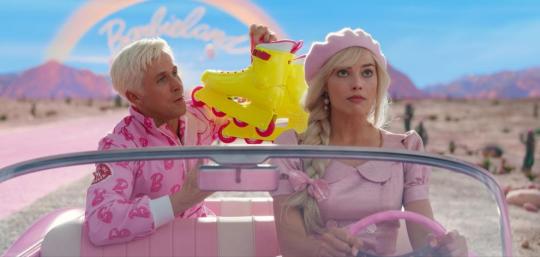
Opinion by Pamela Paul for the NYT, January 24, 2024.
We can all agree 2023 was a good year for the movies. Critically and commercially, several movies did well, and only one of those successes took place within the Marvel cinematic universe. Even the 10 Oscar nominees for best picture, announced Tuesday, included nine actually good films.
Is it safe now to call “Barbie” the outlier? Can I say that, despite winsome leads and likable elements, it didn’t cohere or accomplish anything interesting, without being written off as a) mean, b) old, c) hateful or d) humorless?
Every once in a while, a movie is so broadly anticipated, so welcomed, so celebrated that to disparage it felt like a deliberate provocation. After “Barbie” so buoyantly lifted box office figures, it also felt like a willful dismissal of the need to make Hollywood solvent after a season of hell. And it felt like a political statement. Disliking “Barbie” meant either dismissing the power of The Patriarchy or dismissing Modern Feminism. You were either anti-feminist or too feminist or just not the right kind.
Few dared rain on Barbie’s hot pink parade.
Those who openly hated it mostly did so for reasons having to do with what it “stood for.” They abhorred its (oddly anachronistic) third-wave feminist politics. They despised its commercialism and dreaded the prospect of future films about Mattel properties such as Barney and American Girl dolls. They hated the idea of a movie about a sexualized pinup-shaped doll whose toy laptop or Working Woman (“I really talk!”) packaging couldn’t hide the stereotypes under the outfit.
For those who hailed it, there was a manic quality to the “Barbie” enthusiasm, less an “I enjoyed” and more of an “I endorse.” How fabulous its consumer-friendly politics, its I-can’t-believe-they-let-us-do-this micro-subversions, its prepackaged combo of gentle satire and you-go-girl gumption. They loved it for reclaiming dolls and Bazooka-gum pink, its Rainbow Magic diversity, its smug assurance that everything contained within was legitimately feminist/female/fine. They approved of the fact that Weird Barbie’s quirks could X out Stereotypical Barbie’s perfection on some unspoken political balance sheet. That by being everything to everyone, a plastic doll could validate every child’s own unique and irrepressible individuality. To each her own Barbie!
And now there is a new Barbie cause to rally around: the Great Oscar Snub and what it all means — and why it is wrong. Neither Margot Robbie nor Greta Gerwig was nominated for best actress or best director, respectively. “How is that even possible?” one TV host exclaimed.
“To many, the snubbing of the pair further validated the film’s message about how difficult it can be for women to succeed in —<em> and be recognized for </em>— their contributions in a society saturated by sexism,” CNN explained. Ryan Gosling, nominated as best supporting actor for his role as Ken, issued a statement denouncing the snubs and hailing his colleagues.
But hold on. Didn’t another woman, Justine Triet, get nominated for best director (for “Anatomy of a Fall”)? As for “Barbie,” didn’t Gerwig herself get nominated for best adapted screenplay and the always sublime America Ferrera get nominated for best supporting actress? A record three of the best picture nominees were directed by women. It’s not as if women were shut out.
Every time a woman fails to win an accolade doesn’t mean failure for womanhood. Surely women aren’t so pitiable as to need a participation certificate every time we try. We’re well beyond the point where a female artist can’t be criticized on the merits and can’t be expected to handle it as well as any man. (Which means it still hurts like hell for either sex — but not because of their sex.)
Robbie had far less to do in “Barbie” than she did in “I, Tonya,” for which she justifiably got an Oscar nod. In this movie, she was charming and utterly fine, but that doesn’t make it a rare dramatic achievement.
With “Barbie,” Gerwig upped her commercial game from acclaimed art house to bona fide blockbuster. She was demonstrably ambitious in her conception of what could have been an all-out disaster. She got people to go back to the movies. All of these are successes worthy of celebration. But they are not the same as directing a good film.
Surely it is possible to criticize “Barbie” as a creative endeavor. To state that despite its overstuffed playroom aesthetic and musical glaze, the movie was boring. There were no recognizable human characters, something four “Toy Story” movies have shown can be done in a movie populated by toys.
There were no actual stakes, no plot to follow in any real or pretend world that remotely made sense. In lieu of genuine laughs, there were only winking ha-has at a single joke improbably stretched into a feature-length movie. The result produced the forced jollity of a room in which the audience is strenuously urged to “sing along now!”
A few reviewers had the gall to call it. The New York Post described it as “exhausting” and a “self-absorbed and overwrought disappointment,” a judgment for which the reviewer was likely shunned as a houseguest for the remaining summer season.
In our culture of fandoms, hashtags, TikTok sensations, semi-ironic Instagrammable cosplay, embedded anonymous reviews, sponsored endorsements and online grassroots marketing campaigns, not every critical opinion is a deliberate commentary on the culture or the virtue-signaling of an open letter. Sometimes an opinion isn’t some kind of performance or signifier.
There’s a crucial difference between liking the idea of a movie and liking the movie itself. Just as you could like “Jaws” without wanting to instigate a decadeslong paranoia about shark attacks, you can dislike “Barbie” without hating on women. Sometimes a movie is just a movie. And sometimes, alas, not a good one.
6 notes
·
View notes
Text
An experimental blood test could help detect pregnant women at increased risk for preeclampsia, a serious high blood pressure condition that can harm both mother and child.
Researchers report the test looks at genetic markers found in tiny particles called extracellular vesicles that transfer information between human cells.
Women with preeclampsia followed a specific pattern of these genetic markers compared to women with healthy pregnancies, results showed.
This pattern can form as early as the first trimester of pregnancy, researchers said, and it has the potential to predict the development of preeclampsia symptoms.
Preeclampsia usually occurs after week 20 of pregnancy, and it affects 5% to 8% of all pregnancies, according to the American Pregnancy Association.
The condition can cause liver or kidney failure in pregnant women and increase their future risk of heart disease. If left untreated, preeclampsia can cause stroke, seizures and excessive bleeding in the mother and contribute to low birth weight in newborns.
"It is critical that we take steps toward early detection and prevention of preeclampsia," said lead researcher Dr. Sherin Devaskar, executive chair of pediatrics at UCLA Mattel Children's Hospital.
"It continues to be the leading cause of maternal mortality and morbidity worldwide, and our findings underscore the potential to address this persistent public health concern," Devaskar added in a UCLA news release.
For the study, published Tuesday in the journal Scientific Reports, researchers looked at 14 women with symptoms of preeclampsia, 12 women with healthy pregnancies and seven women who weren't pregnant.
Blood tests revealed specific microRNA patterns in pregnant women with preeclampsia. MicroRNAs are short RNA molecules that regulate the function of genes.
Specifically, pregnant women with preeclampsia had 12 microRNAs in higher amounts and 135 in lower amounts, compared to healthy pregnant women.
This pattern could help doctors flag women at risk for preeclampsia and get them early treatment, researchers said. It also could help improve understanding of why preeclampsia occurs in some women.
More information
The American Pregnancy Association has more about preeclampsia.
6 notes
·
View notes
Text
putting together a list of some of my favourite reads from 2023:
Ozempic, Barbie, and the failure of corporate feminism
Read This Before You Buy That Sweater
Vladimir Nabokov's Butterflies
Inside the Pages of a Medieval Sketchbook
how come these ghosts is white?
Is 5G Going to Kill Us All?
Mattel, Malibu Stacy, and the Dialectics of the Barbie Polemic
I'm a fake brand, in a fake world: The secrets behind designing a great fictional brand for TV and film
What is Brutalist Architecture?
With 'The Far Side', Gary Larson Pioneered the Art of the Meme
A Star Reporter's Break With Reality
Walt Disney cheated his animators out of profits--and their strike changed the world
When Your Parents Are Dying
Here's Why Movie Dialogue Has Gotten More Difficult To Understand (And Three Ways To Fix It)
A Year Later, I Still Can't Stop Thinking About Disco Elysium
Dune Has a Desert Problem
Time Loop Narratives Are About Love
#personal#not necessarily all published this year but ones i read or revisited this year#and i wanted to keep track in a nicer way than just my tabs lol#reading of 2023#subject to change or be expanded upon as i go thru my history and bookmarks lol
6 notes
·
View notes
Text
Masters of the Universe (which was worse, this or The New Adventures of He-Man? Let me know in the comments!), Conclusion
youtube
(Thanks to Warner Bros.)
[All images are owned by Mattel and The Cannon Group MGM. Please don’t sue me]
PREVIOUSLY ON...
The years-long struggle between He-Man and Skeletor has culminated with Skeletor stealing a device known as the Cosmic Key (able to open a portal to anywhere) from an inventor named Gwildor to breach Castle Greyskull and capture the Sorceress. He intends to use the power of Greyskull to steal the Sorceress's power, giving him dominion over the entire universe (somehow)!
He-Man and his allies Duncan (Eternia's Man-at-Arms) and Duncan's daughter Teela recruit Gwildor (who just so happens to have another Cosmic Key) to stop Skeletor and save the Sorceress. However, they are forced to retreat through a portal that Gwildor opened to a random location (that location being Earth). Upon landing, they lose track of the Cosmic Key.
On Earth, we are introduced to Julie (who recently lost her parents) and her sorta-kinda ex Kevin, who find the Cosmic Key. The two get separated as Skeletor's forces attack, with Julie meeting He-Man and his friends (who force Skeletor's forces to retreat) and Kevin running into a police detective named Lubic, who ain't buying Kevin's story.
Now, onto the conclusion of our review! If you would like to watch the film, it’s available on Tubi or behind your favorite paywall.
Back on Eternia, the Goon Squad returns, but without the Cosmic Key or He-Man.

So Skeletor uses Saurod as an example for the price of failure. He then sends Evil Lyn back to Earth with the surviving Goons and a shit-ton of troops, and once they find the Cosmic Key...
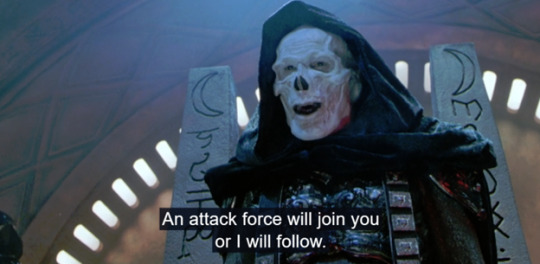
This is very much unlike Skeletor. He’s usually not afraid to get his hands dirty.
Back on Earth, Kevin and Lubic arrive at Julie’s house, but no one’s home. The phone rings and it’s Julie. She tells Kevin to stay put, but he plays coy since he doesn’t want Lubic to know what’s going on (why?) Then Lubuc asks about what the Cosmic Key and begins pressing buttons.
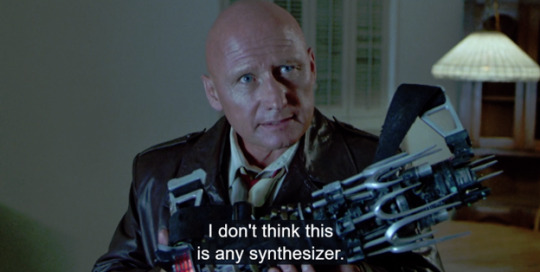
Of course, Lubic playing with the Cosmic Key alerts Evil Lyn and the Goons.
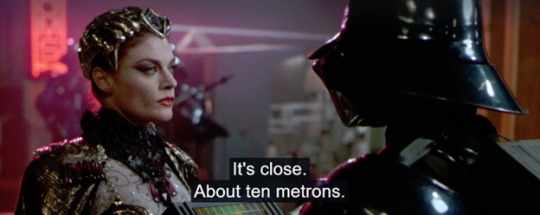
Back at the house, Lubic thinks Kevin stole the Cosmic Key and confiscates it and leaves. A bit later…

…the goons arrive, looking for the Cosmic Key! Kevin is overpowered (naturally), then Evil Lyn puts an electric collar on him.
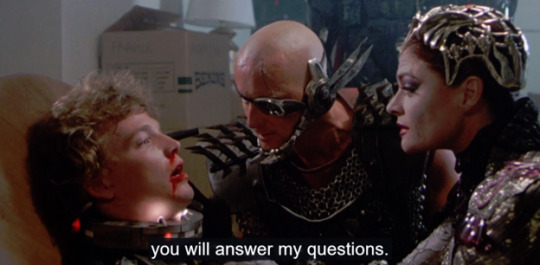
Kevin is put in a trance by the collar and tells Evil Lyn that Lubic has the Cosmic Key, so the Goon Squad leaves to track him down (leaving Kevin in his tranced state; nice guys!), departing just as Gwildor’s stolen car arrives.
Once they get the collar off of Kevin, he comes back to reality and freaks. Fortunately, Julie manages to talk him down.
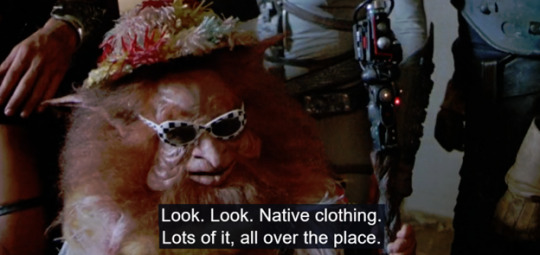
Then Gwildor comes out dressed in Julie’s mother’s clothing, which gets Kevin started again. Once again, Julie talks him down and he finally tells them that Lubic was heading to Charlie’s, so Julie drafts Kevin and off they all go. Let’s hope they arrive before Evil Lyn’s forces.
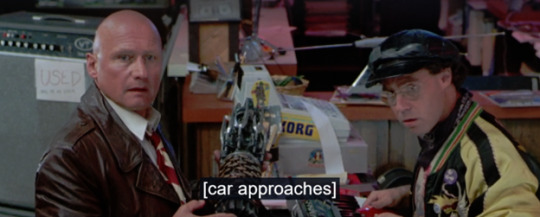
Well, since it’s a car, I would say they do.
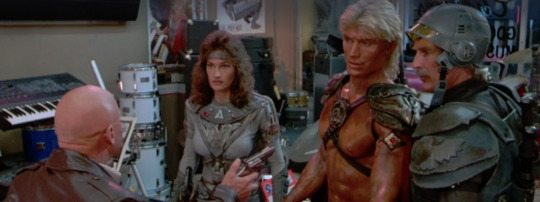
Unfortunately Lubic isn’t too happy with them, despite the fact that they claim the Cosmic Key is theirs. Worse, Evil Lyn and her goons are closing! After Teela disarms Lubic, He-Man tells Gwildor to compute the way home while Teela gets the non-combatants to the back of the store.

I don’t think the store’s gonna help protect them. In the back, Gwildor tries to explain how the Cosmic Key works.

Unfortunately, Gwildor can’t find the right tune to get them home.
Outside, He-Man and Duncan are holding their own against the Goons (though I can’t say the same for the store, which is gonna wind up one big insurance claim by the time this is over! Though I’m not sure if “Alien Invasion” is covered under a business insurance policy)
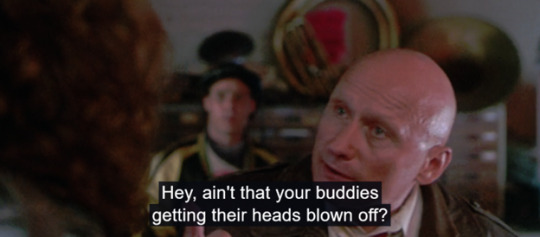
Inside, Lubic convinces Teela to join the fight, so she hands Lubic’s revolver to Kevin and heads out. As Lubic and Kevin argue as to who’s in charge, Julie looks outside…

…and sees her mother, who beckons her outside (You think it’s a trap? I think it might be a trap) Julie naturally heads outside where her mother tells Julie that she and Julie’s father faked their death for a secret project that involves the Cosmic Key, and she needs Julie to bring it to her. In the chaos of Kevin, Lubic, and now Charlie fighting, Julie grabs the Cosmic Key and brings it to her mother, who transforms into...
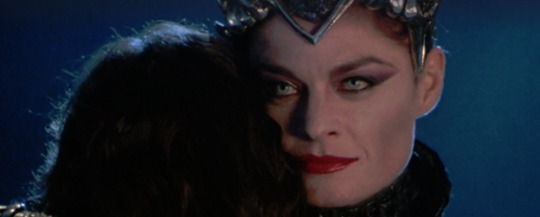
(I KNEW IT!!!! Of course, the film’s special effects budget was so bad they didn’t actually show the transformation)
With that, Evil Lyn calls the retreat. He-Man and his allies (along with Kevin and Julie) give chase, while at Charlie’s…

So rather than help Charlie assess the damage to his store, Lubic’s going on the warpath. Nice to know he has his priorities straight. He then demands that Evil Lyn’s goons surrender.

Yeah, that worked about as well as I expected.
Meanwhile, Evil Lyn signals to Skeletor that she has the Cosmic Key.
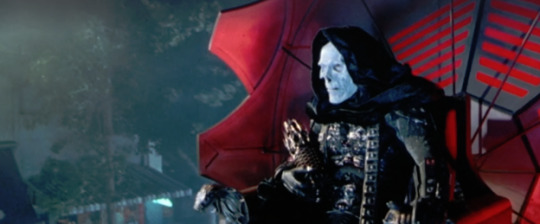
Oh, THAT’S not good! Skeletor and whatever forces aren't quashing resistance on Eternia come through a portal. He then sends them to capture He-Man (You may ask: why not kill him? For once, Skeletor has a valid reason (other than the censors won’t allow killing): He-Man’s a martyr if he’s killed, but if his will is broken, so will Eternia’s be)
Skeletor’s air forces find He-Man, so he and the others enter a building and head to the roof where he borrows Gwildor’s grappler, shoots down one of the pilots, and takes his skimmer.

He then attacks Evil Lyn’s forces to try to get the Cosmic Key back. He-Man uses the grappler to retrieve the Cosmic Key from Evil Lyn (oh, Skeletor’s gonna be PISSED!)
Back at the rooftop…

…Skeletor has found He-Man’s friends! Duncan and Teela open fire, but Skeletor’s magic stops the blasts.

Skeletor tells them to surrender of be filled with more holes than the plot of this movie. Surprisingly, they do and Skeletor’s forces surround them. About that time, He-Man shows up. Skeletor tells him to surrender, and he’ll spare the others…

Surprisingly, He-Man relents. Skeletor then returns to Eternia with He-Man, leaving the others behind. Fortunately, he left Gwildor’s copy of the Cosmic Key behind, so they could return to Eternia, but…

What’s worse, Julie was hit by one of Skeletor’s curses, and without Eternian healing magic she’ll die!
Gwildor explains that the music that played when the Cosmic Key was activated was erased when Skeletor zapped it, rendering it useless even if he could fix it. After a few moments of concentration, Kevin whistles the exact tune from the Cosmic Key (WHAT ARE THE ODDS?)

With that glimmer of hope, Grildor works on repairing the Cosmic Key and setting up a jury rigged adapter as Kevin goes to Charlie's to find a keyboard that wasn't destroyed (Don't worry, Charlie can add the cost to his insurance claim, assuming they believe him)
Meanwhile, Lubic (remember him?) has assembled a SWAT team bunch of beat cops to battle Skeletor’s forces. Too bad Skeletor left, leaving Lubic more or less a laughingstock.
Meanwhile at Castle Greyskull, Skeletor returns with He-Man in chains and prepares to take the last of the Sorceress’s power once the moon rises.
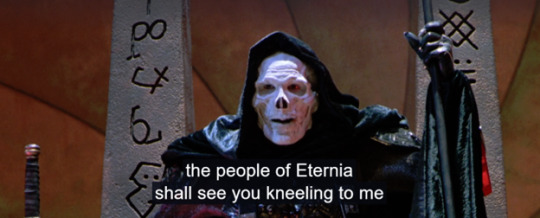
Blade then hands Skeletor He-Man’s sword, which he places next to the throne.
Back on Earth, Kevin returns with the keyboard (and about a dozen cops led by Lubic (the rest went home laughing their asses off) close behind) Julie and Kevin share A Moment as Gwildor hooks the keyboard up. But then…
youtube
(Thanks to Papa Ganteng)
With that, it’s all over except the fallout…starting with Lubic.
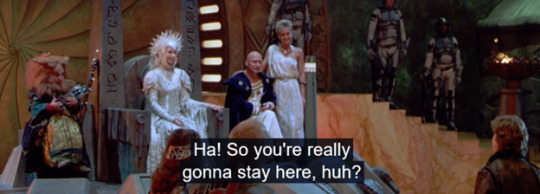
Lubic decides there are worse places to retire to.
Julie is healed from Skeletor’s curse and she decides Jersey isn’t a great place to move to after all, and with that she and Kevin say their goodbyes to He-Man and the others. Gwildor tells them the Cosmic Key could send them to their past or future if they so choose, but they just want to go home.
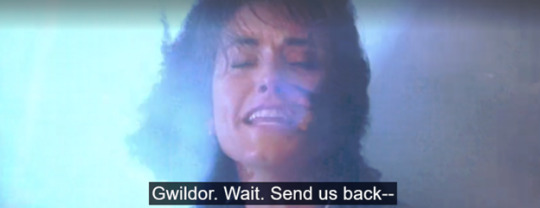
Julie then wakes up in her bedroom (surprisingly not trashed) in the morning. She goes downstairs to find…
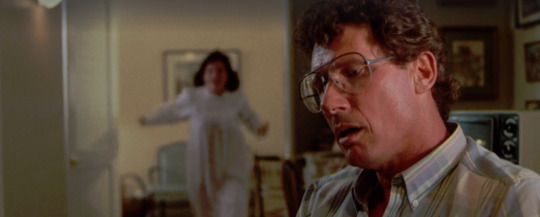
…her parents are still alive! Gwildor sent them back in time to the day they died, meaning Julie could change their future! Julie and Kevin (and Lubic) get their happy ending as we fade out.

Now, normally this would be the end of the review, but I found a YouTube creator who (with a bit of help from Watchmen) made what could’ve been the beginning of the movie…
youtube
(Thanks to Jordan Gingold)
2 notes
·
View notes
Text


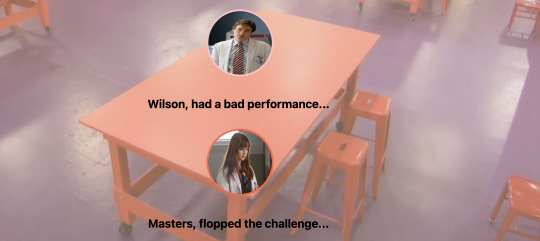
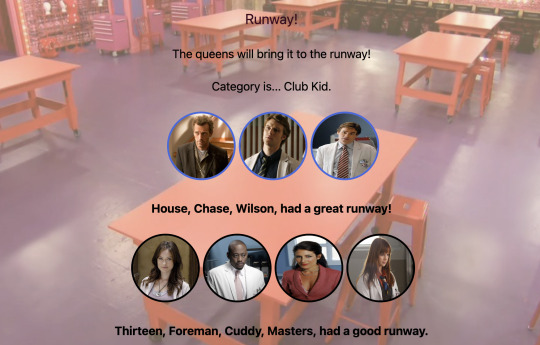

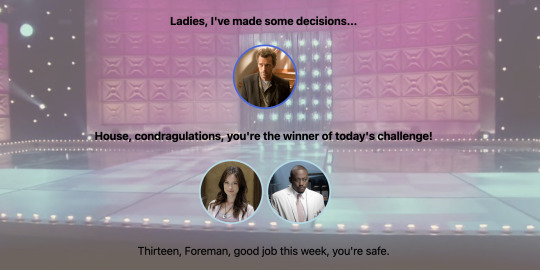


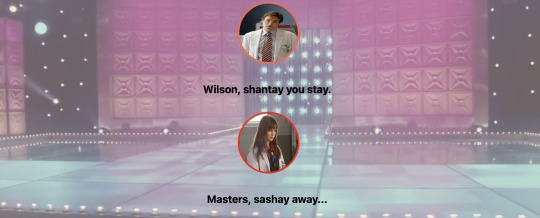
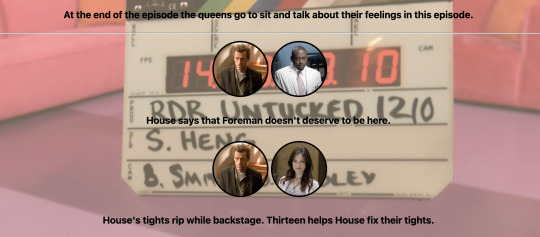
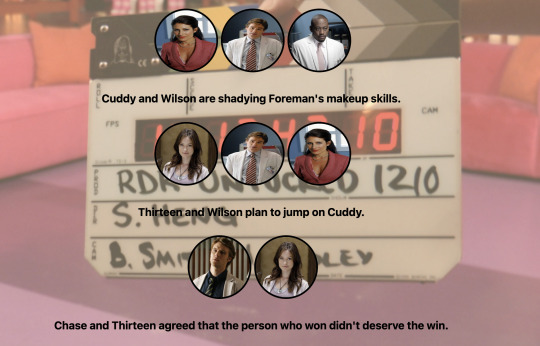

House MD Drag Race Simulation Week 5: The Snatch Game!
Why did my screenshot not capture the name of maxi challenge on the day of the most iconic maxi challenge? For the uninitiated reading this, the Snatch Game is an impersonation contest in the format of the game show The Match Game.
Because the simulator randomly assigns Snatch Game characters to each contestant, I didn't screenshot them, as many were extremely dicey (black celebrity impersonations assigned to white contestants, for example). The Snatch Game is where my computer reset and lost progress, and the first time it did assign House to do Gypsy Rose Blanchard which is just messed up and tactless enough that I think it does actually fit what he would do. So we can keep that one.
Here are my (likely terrible) ideas for the others (tell me your ideas in tags/replies!):
Masters: Elizabeth Blackwell (the first female doctor given a medical license in the United States). It flopped because she memorized a handful of jokes about feminism and couldn't figure out where to take it from there. Once it became clear she was losing she couldn't recover. At one point she couldn't even write a response to Ru's question.
Wilson: Taylor Swift. Thought he could translate House's myriad of jokes about Wilson's and Taylor's dramatic breakups into an impression that would be hip with the youths. Was very, very wrong. So wrong it will go down in Drag Race herstory as an iconic mandatory-watching performance.
Cuddy: Barbara Streisand. Not an inspired pick but she did okay. Mostly was kept out of boring territory for giving Wilson acting notes during the challenge.
Chase: Courtney Act (Australian Drag Race competitor from season 6). His impersonation was spot on but it's understood to be a mistake to do past Drag Race competitors and he ran out of mannerisms to make a joke out of. He's lucky Masters and Wilson flopped so hard.
Thirteen: Taylor Swift. Once she saw Wilson was doing Taylor, and heard his impression, she switched to Taylor because she knew she could do a better one-- which would at least put her into safe territory. A vicious strategic move that will be remembered and studied. Her Taylor Swift was secretly enacting a master plan to win the United States Presidency and take over the world. She brought a prop of a binder to show a fake agreement between her and the CIA to use mass-market music for mind control. She pointed to Wilson's Taylor and said that they switched to that plan because the cloning experiment was an abject failure, just look at how off her clone was.
Foreman: Marjorie Taylor Greene. He knew everyone expected him to be monotone and wanted to show the judges "flexibility." His completely batshit insane acting impressed everyone. In the werk room he said he would just be imitating House.
House: His Gypsy Rose Blanchard was dark, line-crossing, and borderline in very bad taste. It resulted in So Much Twitter Discourse. This was the episode where the producers made him talk about his parents. In context, some of his darker jokes were excused. Seeing how Ru accepted Trixie Mattel's audition tape to be on the show even though her proposed Snatch Game character was Anne Frank, the bad taste argument still wouldn't have stopped him from winning.
Additional commentary:
House has been studying Drag Race after losing the first quiz challenge to Masters. It paid off, and he was even more of an asshole about it than usual to cover for Feelings around the whole "produces making him do the backstory reveal" thing.
Wilson's Taylor Swift was so bad even House tried to gently talk him out of it. House and Thirteen's alliance was threatened by him subconsciously being displeased that she was making a strategic move against Wilson. They survived because in the end he was proud of her for her evil.
Untucked is wild this episode. "Shadying" is not a word. What exactly are Wilson and Thirteen planning on doing to Cuddy?
Wilson tried to make one of his Serious Psychology Arguments about House only going after Foreman's makeup skills because Foreman's comment about acting like him to be Marjorie Taylor Greene hurt his feelings. House responded by saying that in regards to Foreman's mockery, he was going to shake it off and singing the chorus of the song off-key.
All the judges thought Masters had actually walked off out of humiliation, which hinted to them that maybe they did need to send her home.
Wilson and Cuddy are no longer friends because he thinks she sabotaged him by going after him during the Snatch Game.
#house md#hatecrimes md#drag race simulator#drag race#gregory house#james wilson#remy thirteen hadley#robert chase#martha m masters#the snatch game#eric foreman
2 notes
·
View notes
Text
Barbie Movie thoughts
Saw The Barbie Movie tonight, and I liked it. I thought it had interesting and subtle things to say, and I want to put some of these thoughts out there, but not spoil anyone, so I'm giving plenty of warning, putting it behind a cut, and tagging.
This is your first warning.
This is your second warning. I'm about to get into spoilers. If you're on mobile and seeing this, this is your warning to scroll past.
The movie seemed to me to have very interesting things to say on Barbie and feminism and capitalism.
It also did some very interesting things with narrative structure.
This is your final warning before I start actively getting into spoilers.
I don't think the movie really had a villain or an antagonist. The closest thing it had was the Matttel executive board led by Will Ferrel, but they were only mild antagonists. What the movie had was Problems that needed addressing. And those problems were (as I saw them) the Patriarchy, and to a lesser but still very real extent, capitalism.
It grappled with the complicated relationship Barbie has always had with feminism, and the Patriarchy, and its successes and failures. I think I would have been much less satisfied if the movie had come down solidly on one side or another. Instead it acknowledged that it has been empowering in being an alternative to baby dolls that focuses on a woman herself and the roles she can fill in the world, while at the same time hurting women with unrealistic beauty standards.
I very much appreciated how in the Real World the Patriarchy was highlighted as still being extremely oppressive, but knowing how to paper itself over as more progressive. See the businessman Ken spoke to when trying to get a corporate position, and see also the all-male board of Mattel sitting in a pink boardroom at a heart-shaped table, and highlighting the one female CEO of Mattel (maybe two, but highlighted even more by the fact that Ferrel's CEO couldn't remember when she was there or give any names at all). And not to put too fine a point on it, but they literally wanted to put Barbie in a box instead of allowing her to wander around the world having agency of her own.
I also appreciated how enticing the Patriarchy was shown to be to those who only see the potential benefits to themselves and are either unwilling or incapable of understanding how it harms literally everyone. It was very meaningful to me that when Ken brought the Patriarchy back to Barbieland, even the Kens weren't getting what they wanted, or at least seemed to have wanted at the beginning of the movie. They were clearly unhappy with the way things worked in Barbieland, but they weren't resentful towards Barbie until they were told they deserved to be on top. I think this showed really nicely the idea that one kind of supremacy or another isn't the desired goal, the desired goal is equality.
The Capitalism aspect seemed to be a bit more limited, and was more confined to the executive board and Mattel. They were at no point really concerned with the message they were sending as much as the bottom line. They had no qualms about churning out Ken's Mojo Dojo Casa Houses because they were making bank. The CEO thought Gloria's idea was terrible until someone ran the numbers and showed him it would make them a ton of money. The message on Capitalism was more brief, but no less apt. Capitalism is nobody's ally but its own, and will champion any cause it can ride to higher profits.
In the end, neither of the two problems are solved, nor is Barbie's relationship with feminism in the Real World, or even Barbie's story, all of which I find more satisfying than the alternative. If The Patriarchy or Capitalism had been Defeated, I would have found it just as unsatisfying as a sitcom's All Problems Are Solved In Slightly Less Than Half An Hour phenomenon. I think it would have felt too self-satisfied. I liked the ending a lot, grounding Stereotypical Barbie in the real world, having to grapple with a Real Life situation that would be completely alien to anyone in Barbieland.
I also found Ken's "ending" to be poignant as he grapples with defining himself not in terms of Barbie and his relationship to her, but in self-actualization. And it seemed to me that Barbie, in helping him towards this new definition, helped herself towards a more self-focused-actualization than she had been privy to before.
Is Barbie a feminist movie? I don't know, and I'm not sure I'm one who should be making that call. I do know that I like a lot of the messages I took away from it, including that all of the problems faced are complicated and difficult. But what I can say for sure is this is hands down my favorite Michael Cera role. I have never enjoyed him more in a movie. Margot Robbie and Ryan Gosling also knocked it out of the park.
5 notes
·
View notes
Text

dec.10.23
day 7 of abc,,
overate again! no surprise, the scale thing pretty much ruined my day. I feel like my skin is burning and I want to be sick. I'm a failure!!! I am seriously debating f4st1ng tomorrow and then picking back up to normal on Tuesday but I don't want to keep failing. I'll decide that tomorrow. my situationship is also starting to get a little serious and that scares the hell out of me.
anyway, I want to actually v0m1t and I'll probably do as much cardio as I can before I pass out. I am a monster


#i wanna be sk1nn1#i will reach my ugw#pro for me not for thee#tw ana diary#tw ed diet#tw restrictive ed#⭐️ve#0rthor3xia#a4a diary#@n0r3xia#tw b1nge#b1ng3#ed bullshit#bulimba#theresnoth1nsweet234t#theresnothingsweetaboutthisblog#disordered eating mention
4 notes
·
View notes
Text
'It was not too long ago that the future of cinemas looked decidedly grim.
Empire Cinemas fell into administration in early July, as the lingering effects of Covid allied to the cost of living crisis took its toll on the company.
Six Empire cinemas were closed immediately with the loss of 150 jobs, while the future of a further seven, including one in Clydebank, remain in the balance, as they continue to trade and administrators at BDO strive to find a buyer. The company had employed 437 people in total before the failure.
Around the same time, the much bigger Cineworld Group, similarly blighted by the fall-out from Covid, was completing a long-running financial restructuring process which formally ended on August 1, when it exited Chapter 11 bankruptcy in the US.
Cineworld emerged with lower debt and a new management team, its assets having transferred to a new company, though the process resulted in heavy losses for investors.
Throughout the bankruptcy process, business carried on as usual at all the Cineworld outlets, including those trading under the Regal, Cinema City, Picturehouse and Planet brands.
Now, thanks to some of the biggest releases in living memory, many of those theatres will be enjoying their best summers in years.
Cinemas were one of the biggest business victims of the pandemic, as restrictions forced the closure of multiplexes and independents for long spells and the production of films was severely hampered, curbing the flow of new releases.
This year, however, the industry is back with a bang, aided in no small measure by a sequence of summer blockbusters which have attracted audiences in their droves.
Two hotly anticipated movies have been crucial to the revival.
Barbie, a story based on the Mattel doll starring Margot Robbie and directed by Greta Gerwig, hit the billion-dollar mark in gross takings this week, just 17 days after its release, Warner Bros Pictures announced, following one of the biggest marketing campaigns seen for a film in years.
Released on the same day as Barbie was Oppenheimer, the latest epic from director Christopher Nolan, which charts US efforts to develop the atomic bomb as the Second World War drew to a close through the story of physicist J Robert Oppenheimer.
While Oppenheimer has not scaled the same financial heights as Barbie, it had still grossed more than $500m in ticket sales by this week.
Both films have drawn huge audiences in the UK, with Barbie generating sales of £18.5m and Oppenheimer £10.9m on their opening weekend, according to figures compiled by the British Film Institute, and are continuing to pack them in.
But “Barbenheimer”, as the two films have been collectively termed owing to their simultaneous release date, have not been the only shows in town this summer.
Prior to their arrival in theatres, UK cinemas have also been able to drum up millions of pounds in ticket sales from Tom Cruise’s Mission: Impossible - Dead Reckoning Part One, Guardians of the Galaxy Vol. 3, and Indiana Jones and the Dial of Destiny, which is likely to be Harrison Ford’s final outing as the titular archaeologist-come-adventurer.
And there is more to come, with Martin Scorsese’s Killers of the Flower Moon, Dune: Part Two, The Marvels, and The Creator still to come before the year is out.
A recent visit to my local multiplex as various family members took in Barbenheimer underlined the impact which this summer’s big releases have had. People were milling about the foyer in what looked to be unprecedented numbers, which was no doubt great for sales of popcorn and hot dogs.
But the cinemas are not the only businesses which seem to be benefiting from this big summer of film. As we walked through the mall on our way from the car park to the theatre, it was abundantly clear that restaurants, cafes, and shops were doing well too.
With kids off school for the summer, many parents have no doubt been taking their children (Barbie is rated 12A by the British Board of Film Classification) to the cinema over recent weeks to keep them occupied.
David Pierotti, general manager for the Silverburn shopping and leisure mall in Glasgow, said this summer had been a “standout” for the destination, with the “temperamental Scottish weather” playing its part as footfall and sales have risen by 22% and 11% compared with the same period last year.
And he is in no doubt the release of the summer blockbusters has helped.
Mr Pierotti told The Herald: “We are in no doubt that the release of Barbie and Oppenheimer have been massive hits – we believe our Cineworld has enjoyed one of its best months yet which, given the global success of the films, is no surprise and this has also encouraged spend in our other stores and restaurants.”
Of course, going to the cinema is far from cheap so, at a time when inflation is still rampant and interest rates are continuing to rise, businesses will have been encouraged that consumers are showing resilience by going to the movies and visiting restaurants as part of the experience.
How this will all pan out in the longer term is difficult to forecast. The summer holidays will end soon, and the next slate of big movies is unlikely to match the broad appeal of Barbie and Oppenheimer, meaning there will be perhaps less impetus for people to visit their local multiplex.
Cost of living pressures and high interest rates are not going away, and when Christmas eventually comes into view for parents in the autumn, many families will have other things to spend their diminishing disposable income on than trips to the pictures.
Moreover, there is another danger lurking in the wings for the cinema industry.
Ongoing industrial action by actors and screenwriters in the US, who are in dispute with studios over pay and safeguards around artificial intelligence, has disrupted production activity, sparking concerns that the release of films and television shows will be delayed. It was recently reported in the US that Warner Bros may seek to delay the release of Dune: Part 2 until 2024 to ensure its stars, including Timothée Chalamet and Zendaya, will be available to promote the movie on its release.
Film buffs here will be keeping a close eye on developments. In the meantime, cinemas will be hoping the magic of Barbenheimer is just the start of a great theatrical revival.'
#Dune: Part Two#Oppenheimer#Barbie#Barbenheimer#The Marvels#The Creator#Warner Bros#Guardians of the Galaxy: Vol 3#Mission Impossible Dead Reckoning: Part One#Indiana Jones and the Dial of Destiny#Margot Robbie#Greta Gerwig#Christopher Nolan#Killers of the Flower Moon#Martin Scorsese
2 notes
·
View notes
Text
The bell tolls for Barbie in “Barbie”
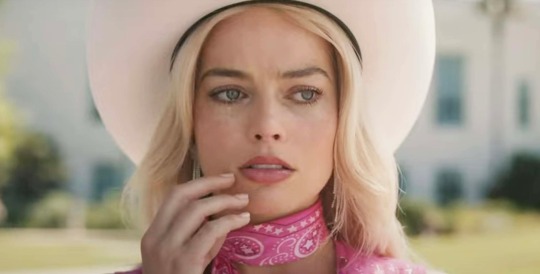
Andrea Nevins’ fascinating 2018 documentary “Tiny Shoulders: Rethinking Barbie” has sat heavily on me for a while now. The movie explores the tenuous future of the world’s most iconic doll alongside her impressive yet troubled legacy. Far from being just a children’s toy, Barbie is an entire socio-political warzone wrapped in plastic –- and arguably, at different times throughout history, she’s been the bomb as much as she’s been the one caught downwind from its shock.
For decades, it was seemingly enough that Barbie allowed little girls the freedom to imagine a world beyond motherhood. That somewhere within her impossible hourglass dimensions –- 36-18-33. Designed by a man, of course –- was the potential for children to occupy spaces of great ambition, fantasy, and glamour within their imaginations.
The idea that if you can see it, you can be it was tightly bound into Barbie’s branding. This was a doll who told girls that they could be anything they wanted to be. Hell, Barbie was an astronaut 18 years before Sally Ride would become the first American woman to take to the stars. And since 1992, she’s put herself forward as a Presidential candidate during almost every U.S. election year.
Aspirational though she may be, Barbie also comes with a great deal of baggage. As “Tiny Shoulders: Rethinking Barbie” states, the doll is also irrevocably tied to endless debates regarding white supremacy, body image, gender, and the many great complicated mythologies of beauty, womanhood, and femininity which tie into these issues. When an attempt was made to make Barbie more relevant to modern girls, it exposed perhaps the doll’s greatest failure: She could be everything –-except relatable.
Barbie could indeed be a great many incredible things. But she was never anything beyond the gender binary or heteronormative. Barbie was never fat, sick, or disabled. She wasn’t ever a shade darker than sunkissed and her hair, whether natural or from a bottle, was blondest of blonde: healthy hair, thick hair, attractive hair, girly hair. The toy reinforced the worst cultural expectations of women –- that anytime we erred beyond the representation of this doll in any way, we had automatically done a disservice to our cultural identity.
Barbie represents an impossible expectation –- one that all women are still expected to live up to, and that not a single one can. Femininity and womanhood can be a great pleasure to inhabit and to enjoy, but it can also be a burden.
In as much as pink can be powerful, it can overwhelm and imprison. To boast it as an adult is to proudly wave the flag of our people -- sissies, bimbos, pin-up girls, and queers -- but not without danger. It is the colour that society would rather hate crime than respect. It is deemed plastic and without value –- for those of us who feel the delirious nuances of the colour deep in our marrow, we know it as a colour of defiance, both a confectionary and a war cry. Delicate and vulgar, it wields the power and vulnerability to destroy and be destroyed.
It’s an idea that Greta Gerwig masterfully slaps onto the screen in “Barbie,” her subversive 2023 pink-puking masterpiece which drills a hole deep into the legacy of Mattel’s plastic cash cow -- hitting dirt, striking oil, and finding gold. Margot Robbie’s interpretation of the iconic doll is one in which she is forced to stare deep into her own complicated void. In “Barbie,” America’s capitalist dreamgirl is having an existential crisis, slamming a dreamhouse party to a stern halt when she casually enquires about whether any of her fellow Barbie dolls ever think about death –- an idea which is hardly a lucrative one in the toy industry.
It’s a slammer of a punchline, and the first instance in which Gerwig smartly contemplates the flaws at the heart of Mattel’s beloved best-seller. What kid hasn’t ever contemplated death? Some of us probably even made deep inquiries about it, hitting the oversized red alarm button equipped inside every parent, teacher, and doctor struggling to explain the tragic catastrophe of life and the human body to an 8-year-old.
As we get older, those feelings become more real: If life is a powder pink dreamhouse (or a super macho mojo dojo casa house, for every Ken reading), then death is its foundations and walls. It’s the hinges on the doors. The frames on the windows. Our mortality, and that of the people we love, is ever-present and unavoidable. And yet, at least in the West, it seems ridiculous to even imagine a Barbie capable of engaging with kids on the topic.
Later in the film, there’s even a commercial for a Depression Barbie –- she wears sweatpants day and night! She spends seven hours scrolling through her estranged best friend’s engagement photos on Instagram! Yes, she’s watching BBC's “Pride and Prejudice” again for the seventh time until she falls asleep and yes, that Starburst share-bag is fucking empty now, please and thank you.
In a film full of funnies, the advert garnered one of the biggest laughs at the screening I was at. It’s a simple joke –- maybe the most basic one there is on the topic. And yet every woman in that cinema reacted as if they’d never had this particular experience acknowledged by such a massive, mainstream film before. And by all accounts, maybe they haven’t.
But the joke concerning Barbie’s sudden anxiety regarding this mortal coil is obviously two-fold. While Barbie’s brain is slumping into sadness-in-sweatpants mode, her sudden focus on death is also a reflection of the doll’s current troubled state. In a world in which girls are able to better project their blossoming identities against video game characters and simulations, YouTube stars, and beauty apps that allow them to become and evolve their own avatars however they like, what do they need a chunk of plastic for? Particularly one who doesn’t look like them or who seemingly doesn’t share any of their values or concerns? In “Barbie,” Robbie’s sentient meta-doll is forced to face her burgeoning irrelevance head-on when she meets who she believes to be her human counterpart –- sullen teen Sasha (Ariana Greenblatt), who reads the doll to filth for crimes against feminism. “You’re a fascist,” she tells Barbie, who fails to connect the dots on her long-criticised Aryan head.
For a long time, Barbie dolls have been symbolic of larger problems and discussions, and occasionally even pointed to as a problem itself. As Robbie told ABC, “It seems like over the last 64 years, it hasn't taken much for Barbie to ignite conversation or sometimes, you know, revolutions or protests.”
When Sasha’s Mum, Gloria (America Ferrera), enters the picture, we realise that she is actually this Barbie’s human counterpart and a woman experiencing her own crisis.
In the film’s third-act monologue, she delivers a speech that not only embodies how many modern women feel at odds with each other and with themselves but also of the challenges facing Barbie –- as a doll, an icon, and a symbol of womanhood. One which cannot be everything to everyone. Barbie being representative of only the slimmest slice of the gigantic, multifaceted, and often downright depressing pie that the experience of being a woman can be reduced to. “It is literally impossible to be a woman,” Gloria begins. “... We have to always be extraordinary, but somehow we're always doing it wrong.”
Laying out the exhausting and contradictory expectations often placed on women, Gloria states, “I'm just so tired of watching myself and every single other woman tie herself into knots so that people will like us. And if all of that is also true for a doll just representing women, then I don't even know."
In “Tiny Shoulders: Rethinking Barbie,” Mattel’s head of Barbie design, Kim Culmone comes up against these same contradictions in trying to solve the dilemma of making the doll relevant again. It’s harrowing to watch Culmone, a woman with the purest of intentions and the greatest of passions for her job, consistently tie herself in knots in trying to solve an impossible puzzle. It’s one thing to redesign Barbie to better reflect a variety of shapes, sizes, shades, genders, and abilities. It’s another to be faced with the reality of that.
Barbie’s newly designed image may better reflect a wider cross-section of women, but it faced prejudice and mockery from focus groups. Furthermore, a new variety of dimensions also created complications –- Barbie’s one-size-fits-all system could no longer apply to a toy line celebrating diverse body types. That meant increasing the price point of Barbie dolls and accessories, making them even more inaccessible to low-income families. Like Gerwig's Barbie, when this new configuration of the dolls hit the real world, they were faced with the problems of the real world, too: All of its hatred, oppression, and narrow-mindedness crashing down upon their beautiful fat, disabled, non-binary, Black plastic bodies with all the weight of a Daily Mail-sponsored demolition compactor.
It's a fascinating if melancholy documentary. And it also shares a commentary in common with Gerwig’s comedic take on the doll –- and in turn, on the impossible demands of womanhood within a system designed against us. Barbie is confined by many boxes –- literal, symbolic, metaphorical. And all of them relate to the ways in which we, as women, are likewise boxed in and shut out of spaces that should be otherwise accessible to us.
Within this Hellraiser puzzle box of life, it’s easy to ascribe the lament configurations society holds for us as permanent parts of our identity: That to be feminine is to be weak and submissive and to be a woman is to diminish our ambitions, and our instincts in favour of something palatable and easy. Maneuverable. Historically, women and all feminine people have been forced to exist within a projection of other people’s fantasies. Something inhuman and malleable, experiencing every last distasteful feast that life and the world have to offer without reacting to their bitterness. As Gerwig's "Barbie" very simply suggests, the patriarchy just wants us to be dolls who stay in our lane.
This is why the way we are represented is important –- by documentaries, by movies, or by toys. To be only sold aspirational messaging without acknowledging the myriad of obstacles on the long road to success is a monumental failure and a disservice to the young women being set up for the slamming disappointments that life has to offer. Our experiences have value. And while we may all share some common ground on that, our diverse backgrounds and identities will always separate us within spaces within which we should be united.
It's not enough anymore for the world's most iconic doll to encourage big dreams from little girls. We know there are fewer obstacles for women in most careers these days, -- Barbie's plump, pick-me CV certainly suggests as much, anyways -- but that doesn't mean we're any more welcome within the mojo dojo casa houses of those spaces.
What is lacking is the acknowledgment of our basic needs and humanity: The space to be as unattractive, weird, sick, loud, stupid, and desperate as men are given. We want to be allowed to struggle and to fail -- even if that means staring straight into the valley of death and attempting a stunt down and through it.
United or not, what we do have in common is the small stuff: We’ve all dreamt of the fantastic and the unachievable. We carry impossible standards, and we unconsciously or otherwise likewise subscribe to them, too. But in our hearts, we’re all complex and messy, floating from one crisis to another. And I mean, who hasn’t stopped a party cold by talking inappropriately and unprovoked about death?
That version of the doll may not sell, but it could be the one version of womanhood that we can all agree on. We're pink, and we wield the power and vulnerability to destroy and be destroyed.
3 notes
·
View notes